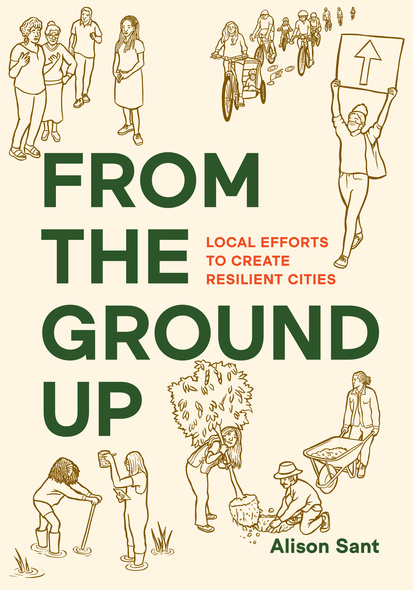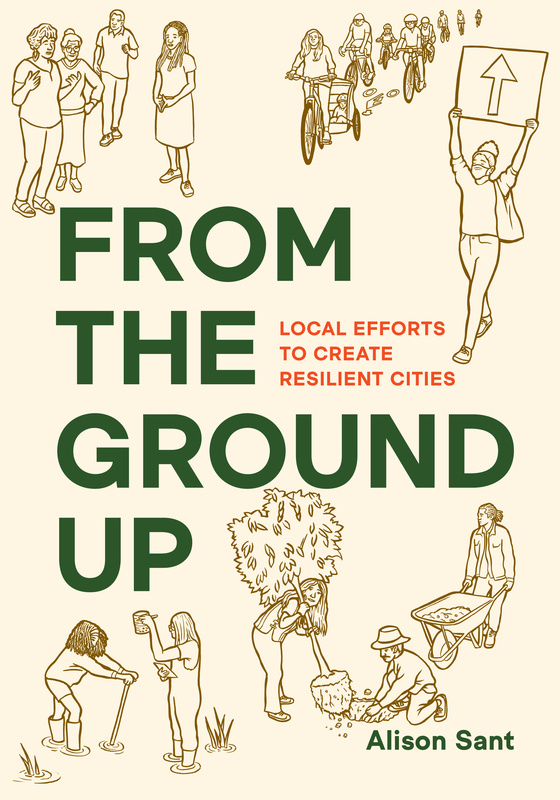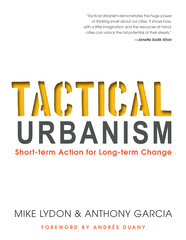
304 pages, 7 x 10
81 photos, 32 illustrations
Paperback
Release Date:11 Jan 2022
ISBN:9781610918961
For decades, American cities have experimented with ways to remake themselves in response to climate change. These efforts, often driven by grassroots activism, offer valuable lessons for transforming the places we live. In From the Ground Up: Local Efforts to Create Resilient Cities, design expert Alison Sant focuses on the unique ways in which US cities are working to mitigate and adapt to climate change while creating equitable and livable communities. She shows how, from the ground up, we are raising the bar to make cities places in which we don’t just survive, but where all people have the opportunity to thrive.
The efforts discussed in the book demonstrate how urban experimentation and community-based development are informing long-term solutions. Sant shows how US cities are reclaiming their streets from cars, restoring watersheds, growing forests, and adapting shorelines to improve people’s lives while addressing our changing climate. The best examples of this work bring together the energy of community activists, the organization of advocacy groups, the power of city government, and the reach of federal environmental policy.
Sant presents 12 case studies, drawn from research and over 90 interviews with people who are working in these communities to make a difference. For example, advocacy groups in Washington, DC are expanding the urban tree canopy and offering job training in the growing sector of urban forestry. In New York, transit agencies are working to make streets safer for cyclists and pedestrians while shortening commutes. In San Francisco, community activists are creating shoreline parks while addressing historic environmental injustice.
From the Ground Up is a call to action. When we make the places we live more climate resilient, we need to acknowledge and address the history of social and racial injustice. Advocates, non-profit organizations, community-based groups, and government officials will find examples of how to build alliances to support and embolden this vision together. Together we can build cities that will be resilient to the challenges ahead.
The efforts discussed in the book demonstrate how urban experimentation and community-based development are informing long-term solutions. Sant shows how US cities are reclaiming their streets from cars, restoring watersheds, growing forests, and adapting shorelines to improve people’s lives while addressing our changing climate. The best examples of this work bring together the energy of community activists, the organization of advocacy groups, the power of city government, and the reach of federal environmental policy.
Sant presents 12 case studies, drawn from research and over 90 interviews with people who are working in these communities to make a difference. For example, advocacy groups in Washington, DC are expanding the urban tree canopy and offering job training in the growing sector of urban forestry. In New York, transit agencies are working to make streets safer for cyclists and pedestrians while shortening commutes. In San Francisco, community activists are creating shoreline parks while addressing historic environmental injustice.
From the Ground Up is a call to action. When we make the places we live more climate resilient, we need to acknowledge and address the history of social and racial injustice. Advocates, non-profit organizations, community-based groups, and government officials will find examples of how to build alliances to support and embolden this vision together. Together we can build cities that will be resilient to the challenges ahead.
It’s the details from her interviews that make this book a valuable tool. Seeing how change is made allows readers to understand how, in their own communities, they too might be able to forge fruitful relationships to dismantle racist histories in favor of equity while equipping their city to handle climate change.
The contribution of the book lies in its practicality and applicability, showing us how this knowledge is operationalized in real-life cases and communities. As such, this book can be best read by fellow city-makers, urban planners, as well as researchers interested in the bottom-up approach for inspiration and to find applicable ideas for setting up community initiatives that last.’
The book is intended as a ‘call for action’ by showcasing exemplars of progressive urban change, demonstrating how neighborhoods and cities can be transformed to improve resilience and equality. It is beautifully written and illustrated, reflecting a care for detail and clarity that is a feature of the patient, humble nature of much of the work of the citizens, activists, public servants and professionals that it reports.’
Especially and unreservedly recommended reading for environmental activists and governmental policy makers, From the Ground Up: Local Efforts to Create Resilient Cities is a clarion and illustrated call to action regarding the necessity for communities to become climate resilient in the face of inexorable climate change driven impacts while acknowledging and addressing the unfortunate social and racial injustice of past urban developments.'
From the Ground Up is an exciting contribution to action and debate about how cities can be transformed to adapt to changing climates, restore degraded environments and address social and racial injustice. The case study stories are presented in rich detail, demonstrating the power and promise of small interventions, without shying away from the struggles and persistence required to achieve progress. It is a useful casebook to share knowledge and inspire impactful action to create towards more resilient, just cities.’
This clearly written book is the outcome of very thorough research by the author on actions by communities elaborating solutions for their neighborhoods to make them more livable, adaptable, and to mitigate the adverse impacts of climate change.’
Alison Sant’s adoration of urban ecosystems is palpable in From the Ground Up. Starting from the soil, she walks with leaders in cities’ natural resources and follows the interconnectedness of the streams below our sidewalks and the branches that brush our skyscrapers, the waters that lap our coastlines, and the people in neighborhoods who make it all possible. For those of us planning amidst multiple interconnected crises, Sant’s From the Ground Up is a critical reminder that the best solutions are led by communities first.
Resiliency is more than infrastructure, organization, finance, and process. It’s all those things, but first and foremost, it’s about people seizing the resources at hand and taking control of our collective destiny. This is hard work, but fortunately, in this great read, Alison Sant points the way.
If you are like me and hope sometimes fails you, I have good news: Alison Sant has come to help. From the Ground Up surveys American cities not for their failings, but for the means of their future remaking. Her solution: Listen. Watch. Inquire. Communities, most especially communities of color, are developing solutions that do work. Show; don’t preach. If people like your idea, they will start doing it too. It’s ecological democracy. It’s not giving in. In this book are examples from sea to shining sea.
Alison Sant is a partner and co-founder of the Studio for Urban Projects, an interdisciplinary design collaborative based in San Francisco that works at the intersection of architecture, urbanism, art, and social activism. For more than 15 years, the Studio has focused on public programming, urban prototyping, and civic dialog – aiming to bring social justice and sustainability to the design of cities. Sant is the author of From the Ground Up: Local Efforts to Create Resilient Cities (Island Press, 2022) a book that examines how American cities are mitigating and adapting to climate change while creating greater equity and livability. She has taught at the College of Environmental Design, University of California Berkeley, the California College of the Arts, Mills College, and the San Francisco Art Institute.






